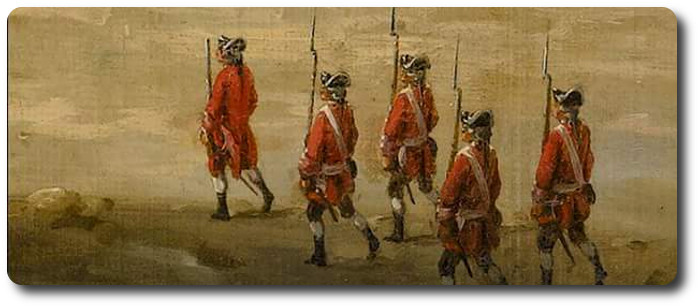
Commanders-in-Chief
Generals on the Staff
Aid-de-Camps
Colonels
Majors
Adjutant
Quarter-Master
Surgeon
Chaplain
Paymaster
Young Officers
Serjeant-Major
Quarter-Master-Serjeant
Serjeant
Corporal
Drum-Major
Drummer
Private Soldier
Advice to the Officers of the British Army
with the addition of some hints to the drummer and private soldier
Chapter VIII
To the Surgeon
A regimental surgeon must invert the apothecaries' maxim, of drenching the patient with medicines; and must be a great advocate for leaving nature to her own operations; unless he has discovered some such useful and unchargeable panacea as Doctor Sangrado's.
The great secret of your profession is the art of substitution. By this you may provide yourself with medicines, the produce of your own native soil, which will rival in excellence the most expensive articles from the Levant or the Indies. Thus chalk will do for crab's eyes, or any testaceous powder, oil of turpentine, for balsam of capivi, and oak bark, for Peruvian. By the way, it would be inconsistent with your character, as a good Protestant, to encourage those thieves the Jesuits, by using any of their medicines; and you have a further inducement, as a patriot, to promote the consumption of British commodities, in preference to those of strangers.
By this art of substitution, a comfortable bowl of punch may, on an emergency, be compounded out of the medicine chest. Honey will serve for sugar, vitriol affords a good acid, and spirits of wine will do for rum or brandy.
Whenever you are ignorant of a soldier's complaint, you should first take a little blood from him, and then give him an emetic and a cathartic—to which you may add a blister. This will serve, at least to diminish the number of your patients.
As the soldiers are apt to be extremely troublesome to the surgeon of a regiment, and your mate may be ignorant, or too much of a gentleman, take a private man out of the ranks, and instruct him to act as your deputy. The principal part of his business will be to bleed and dress sore backs; as soon as he is expert in these you may teach him to draw teeth which is soon acquired—but then he must take care in performing this operation to give the men a confounded pull, in order to show them that he is not a common tooth-drawer.
You may afterwards teach him the method of making up your prescriptions. If he should mistake arsenic for cream of tartar, it is not your fault, and it is a hundred to one it will never be found out; and should he in bleeding divide an artery, or lame a soldier it is an accident, you know, that might have happened to the first surgeon in England.
If a patient seems likely to cost you some trouble or medicine, report him incurable, and persuade the colonel or commanding officer to discharge him.
Whenever you are ignorant of a soldier's complaint, you should first take a little blood from him, and then give him an emetic and a cathartic—to which you may add a blister. This will serve, at least to diminish the number of your patients.
Keep two lancets; a blunt one for the soldiers, and a sharp one for the officers: this will be making a proper distinction between them.
If it is the custom of your regiment for the soldiers to be cured of the venereal disease gratis, give yourself but little concern about them; and be sure to treat them as roughly as possible. Tenderness towards patients of that kind is only an encouragement of vice; and if you make a perfect and speedy cure, they will soon forget the inconveniences of the disorder; where as they carry some mementos about them, it will make them thence-forward the more cautious. If you are paid for it, you may observe nearly the same conduct towards them; for experience shows, that cure them as often as you will, they soon contract it again; so it is only so much labour and medicine thrown away. Besides, as the ladies of the camp or garrison are pretty much in common, these men may, by circulating the disorder, procure you some practice among the officers.
Order your deputy carefully to preserve all the poultices used in the hospital. They may go in part of his wages; and he will sure to find a purchaser among the sutlers in camp, or the poulterers in town. In this, however, you may meet with some opposition; for it may be considered by the nurse as a part of her perquisites.
If any of the soldiers' wives or children happen to be taken ill, never give them any assistance. You receive no pence from them, and you know ex nihilo nihil sit. Excuse yourself by saying, which you probably may with much truth, that you have not medicines enough for the soldiers.
When the flux or any putrid disorder reigns in the camp or garrison, be sure to procure wine for the use of your hospital. But consider, although it is a great anti-septic, it is also inflammatory; and therefore to be given sparingly to your patients. The remainder may serve to treat your brother surgeons and mates with; and indeed will be necessary to prevent your taking any infectious disorder.
Inoculation affords a pretty comfortable douceur to gentlemen of your profession, a guinea per head being allowed by Government for that operation. But as it is only to be performed with the soldier's consent, you should recollect, that the common people are commonly blind to their own interest, and therefore persuade as many as you can to agree to what is so much for their advantage. If you should by mistake inoculate a soldier that has already had the infection, it will not be attended with any ill consequences; and if you should perform the operation on one who is sickening with the distemper, it will not in the least add to its malignity.
When a soldier receives a wound in a leg or an arm, immediately fix the tourniquet, though there may be the fairest prospect of preserving the limb. This will save you a world of trouble, and your patient a vast deal of pain. You will, besides, do him a most essential benefit, in sending him to enjoy the repose of Chelsea hospital instead of being dragged from one place to another at the perpetual risk of having his brains knocked out: partial evil is universal good; and the sacrifice of a limb may eventually be the preservation of all the rest of his carcase.
- The O'Leary Collection; Medals of The Royal Canadian Regiment.
- Researching Canadian Soldiers of the First World War
- Researching The Royal Canadian Regiment
- The RCR in the First World War
- Badges of The RCR
- The Senior Subaltern
- The Minute Book (blog)
- Rogue Papers
- Tactical Primers
- The Regimental Library
- Battle Honours
- Perpetuation of the CEF
- A Miscellany
- Quotes
- The Frontenac Times
- Site Map
QUICK LINKS

- The Senior Subaltern
- Staff Duties and the Young Officer
- How to Write Effective English
- Notes and Quotes - Staff Duties
- Advice to Officers (1782)
- Mess Rules of the Infantry School (1884)
- A Dozen Military Epigrams (1901)
- How The Loafer's Bred (1904)
- The Promotion and Examination of Army Officers (1904)
- A Few Tips for Officers, Before and After Joining (1906)
- Standing Orders of The RCR (1910)
- Standing Rules for Officers' Messes of The RCR (1913)
- The Young Officer's Guide to Knowledge (1915)
- The Duties of an Officer (1916)
- An Open Letter to the Very Young Officer (1917)
- Advice to a Young Officer (1917)
- Battalion Duties; Officers, NCOs, and Soldiers (1917)
- Pleasing Infantry Brigadiers (1917)
- Role and the Responsibilities of the CO in a Battalion Mess (1917)
- The RCR, "A" Company Standing Orders (1918)
- Some Staff Duties (1923)
- An Officer's Code (1925)
- Hints on Promotion Exams (1925)
- On Writing Appreciations (1926)
- The RCR; Rules for Officers' Messes (1927)
- Morale And Leadership (1929)
- RCSI Hints for Young Officers (1931)
- RCSI Notes on Drill (1931)
- The Study of War by Junior Officers (1932)
- Self-Training (1934)
- "The Problem of the First Ten Years" (1934)
- Standing Orders of The RCR; 1935)
- Customs of the Service (1939)
- Drill and Discipline (1939)
- Leaders Win Where Commanders Lose (1939)
- The Officer and Fighting Efficiency (1940)
- Officers' Mess (RCAF, 1940)
- The Duties of an Officer (1942)
- Comrades in Arms (1942)
- Example Standing Orders - Subalterns (1942)
- Hints for Newly Commissioned Officers (1943)
- Completed Staff Work (1943)
- FOLLOW-ship (1943)
- Hints for Junior Officers (1945)
- Officer-Like Qualities (1948)
- Military Writing (1948)
- An Analysis of the Sub-Unit Commander (1949)
- Leadership (1950)
- Neptune's Notes (undated, 1950s-60s)
- Thinking and Writing (1953)
- Examination Tactics (1953)
- Officers (1954)
- On Writing Examinations (1954)
- Customs of the Army (1956)
- 1st Bn, The RCR, Senior Subaltern (1956)
- Pigs Have Wings (1960)
- Leadership and Man Management (1960)
- Officers (1964)
- 1RCR - The Sergeants' Mess - "Tips" (1971)
- 2RCR Junior Officer's Handbook (1973)
- How to be a Successful Subaltern (1978)
- Foreword to the Infantry Journal, No. 8 (1979)
- Do You Appreciate the Finer Points of Life? (1980)
- The RCR Regimental Standing Orders - Senior Subaltern (1992)
- Infantry Company Command (2016)
- A Miscellany of Advice for Subalterns
- The Young Officer and the NCO - Quotes
